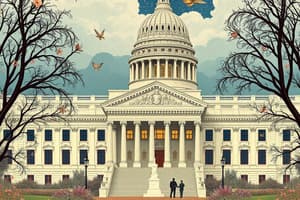Podcast
Questions and Answers
Which of the following powers are expressly denied to the national government? (Select all that apply)
Which of the following powers are expressly denied to the national government? (Select all that apply)
- Conduct illegal searches (correct)
- Prohibit freedom of religion (correct)
- Leavy taxes (correct)
- Deny a speedy trial (correct)
Which powers are denied to the national government due to the silence of the constitution? (Select all that apply)
Which powers are denied to the national government due to the silence of the constitution? (Select all that apply)
- Set up local government units (correct)
- Create a public school system (correct)
- Levy taxes on state income
- Enact uniform marriage laws (correct)
What does the federal system ensure regarding national government powers?
What does the federal system ensure regarding national government powers?
The national government should not have powers that threaten the system.
What does the 10th Amendment state about state governments?
What does the 10th Amendment state about state governments?
Which of the following powers are reserved to the states? (Select all that apply)
Which of the following powers are reserved to the states? (Select all that apply)
What power does the 21st Amendment, section 2 grant to the states?
What power does the 21st Amendment, section 2 grant to the states?
Which powers are expressly denied to the states? (Select all that apply)
Which powers are expressly denied to the states? (Select all that apply)
What are inherently denied powers to the states?
What are inherently denied powers to the states?
What does the 10th Amendment clarify about powers?
What does the 10th Amendment clarify about powers?
Study Notes
Powers Denied to the Federal Government
- The Constitution expressly denies specific powers to the national government, including:
- Prohibiting Congress from levying taxes unjustly
- Protecting freedoms such as religion, speech, press, and assembly from national infringement
- Banning illegal searches or seizures by Congress
- Ensuring the right to a speedy trial and jury for those accused of crimes
Powers Denied Due to Silence of the Constitution
- Some powers are absent from the Constitution, including:
- Authority to create a public education system at a national level
- Power to implement uniform marriage and divorce laws
- Capability to establish local government units
Powers Denied by the Federal System
- The Constitution aims to preserve the federal system by denying the national government powers that could threaten states, such as:
- Prohibition on taxing states or state agencies to ensure their viability
10th Amendment and Reserved Powers
- The 10th Amendment establishes that powers not granted to the national government are reserved for state governments
- States have rights that the federal government cannot encroach upon
Reserved Powers of States
- States possess certain powers including:
- Restricting marriage for individuals under 18 without parental consent
- Regulating alcohol purchases by individuals under 21
- Banning the sale of pornography
- Requiring professional licensing for various occupations
- Establishing public school systems and enacting land use regulations
Regulation of Alcohol by States
- The 21st Amendment, section 2 grants states extensive authority to regulate the manufacture, sale, and consumption of alcoholic beverages
Powers Explicitly Denied to States
- States cannot:
- Enter into treaties or alliances
- Print or coin their own money
- Deprive individuals of life, liberty, or property without due process
Inherently Denied Powers to States
- States are prohibited from taxing federal agencies or functions, preserving federal authority
Understanding the 10th Amendment
- The 10th Amendment affirms that powers not assigned to the federal government or denied to the states are reserved for the states or the people, emphasizing the principle of state sovereignty
Studying That Suits You
Use AI to generate personalized quizzes and flashcards to suit your learning preferences.
Description
Explore the powers denied to the federal government and the powers reserved to the states through these informative flashcards. Understand the constitutional restrictions placed on Congress and the protection of individual rights.




